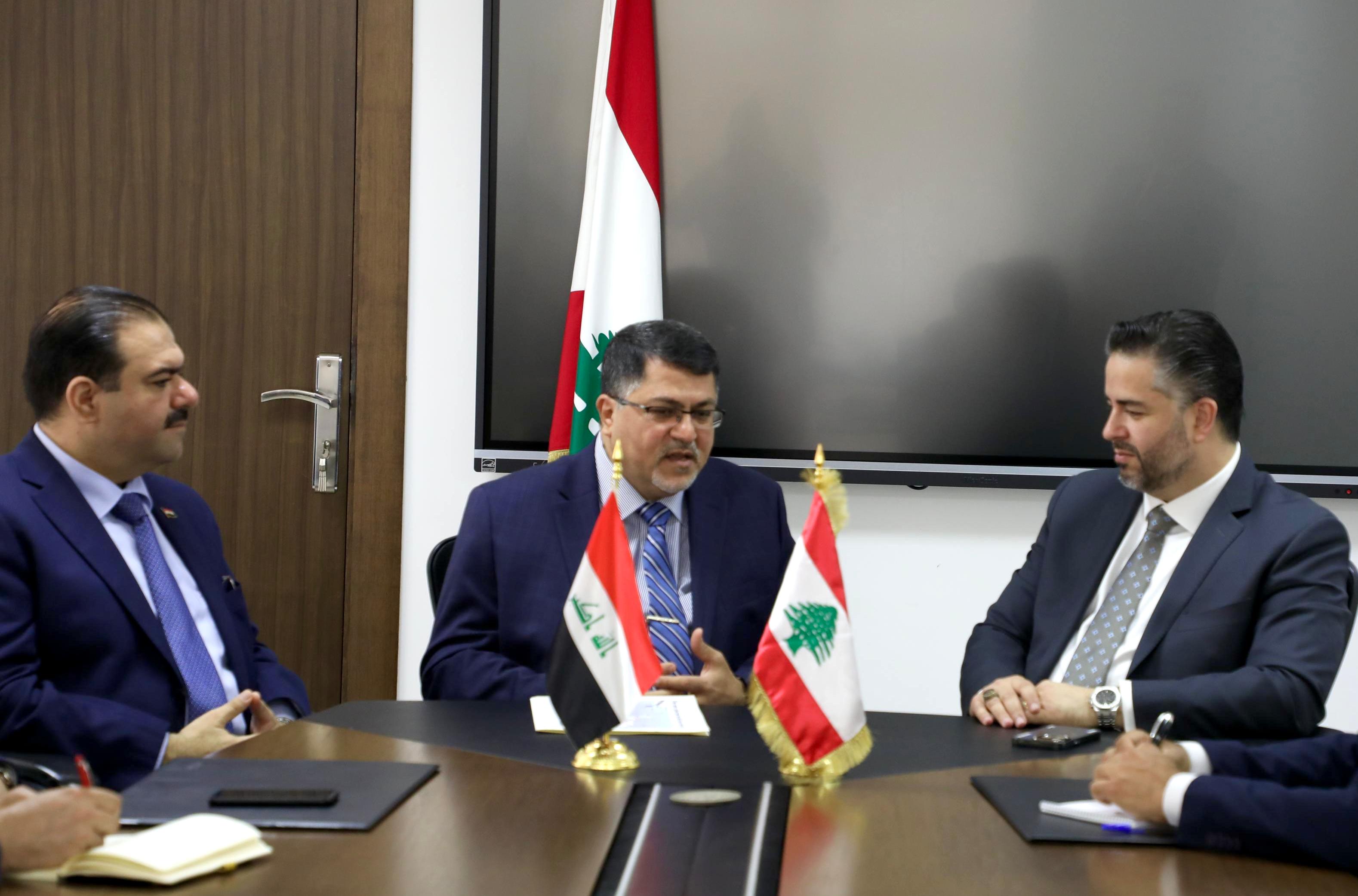 Lebanese Republic
Lebanese Republic Salam to the delegation of the Iraqi Investment Commission
Lebanon has a geopolitical interest in re-activating the oil lines between Iraq and Lebanon in addition to incorporating fiber optic communication network for the project

Minister of Economy and Trade, Amin Salam, in his capacity as the Head of the Joint Iraqi –Lebanese Committee from the Lebanese part, held an extended meeting in his office at the Ministry with the Head of the National Investment Authority in the Republic of Iraq, Dr. Haider Muhammad Makkiya and the accompanying delegation, which comprised engineers from the Iraq's Oil Pipeline Company and Informatics and Telecommunication Public Company in addition to legal counselors.
To this end, the meeting was devoted to discuss on rehabilitating the existing oil pipelines between Syria and Lebanon, especially that they are at the end of their service life as well as the Lebanese Government does not have the ability to finance nor the Syrian Government either; knowing that the laws prohibit to disburse money outside the Iraqi legal framework. For this reason, the Iraqi party or authorization or acquisition while safeguarding the sovereignty of both countries and working on extending an Arab optical fiber communications network.
In this regard, Dr. Haider Makkiya informed Minister Salam about PM Mikati’s welcoming on this step, requesting the support of the Ministry of Economy and Trade and the Minister in following up on this file given its strategic economic benefit for Lebanon and the region in the future; especially with the Republic of Iraq’s constant tendency to stand by Lebanon and help in its recovery.
Makkiya also considered that for this project to succeed, the Lebanese government and Parliament must cooperate to issue the necessary laws and decrees to allow the Iraqi Authority to use or possess the lands necessary to complete this project in order to be able to disburse these huge amounts while preserving Lebanon’s sovereignty right and following the necessary steps to preserve this project. In addition, he stated that the amount of the trade exchange through the Gulf ports exceeds $10 billion annually in the field of petroleum and trade industry.
On his turn, Minister Salam welcomed the Iraqi delegation, thanking them for their continuous and supportive fraternal initiatives towards Lebanon, whether in terms of providing fuel for electricity or wheat, and whether working to revive Lebanon economically; reactivate Iraqi oil pipelines and help Lebanon play its constructive geopolitical role.
He added: “With the Arab rapprochement between the Kingdom of Saudi Arabia and the Syrian Arab Republic in addition to the re-operation of flights between Damascus and Jeddah, it seems that things are moving towards openness and it is time for Cesar Law to eventually relieve Lebanon from the Syrian displacement pressures and help in the reconstruction of Syria, which will provide significant job opportunities for various types of companies.
Moreover, he emphasized his support for the Iraqi project given its high national interest and benefit for Lebanon, the Lebanese people and the State.
Salam also assured that intentions exist to proceed with this project, stressing that its success is also linked to the positivity shown from the Syrian side; and the impacts of the Iraqi project, in all its phases, are positive; and consequently, emphasize the importance of Lebanon’ strategic location on the Mediterranean Sea; a thing we should benefit from, in all its details..
Following up on the Iraqi project and any side projects that may be attached to and the additional benefit; Salam drew the attention to the following:
- Port of Tripoli: he explained to the delegation its characteristics as an expansive port contrary to the port of Beirut with its known for its limited and narrowed area; in addition to the importance of Tripoli port given its closeness to the Syrian and Turkish coasts being an important entry to Central Asia on the economic and trade level.
- Renee Mouawad airport in Qlayaat which is about 6 kilometers far from the Lebanese- Syrian borders. It is essential to bring it back into service and consequently, benefit from the Iraqi investment projects.
- The north coast which encompasses huge areas of significant lands located on the Mediterranean Sea that can constitute strategic crossings for significant industrial projects from the Arab world to Europe and the West.
Accordingly, both sides agreed to speedily and carefully follow up on the project while awaiting the Syrian response to the proposal of the Iraqi delegation, which will visit the Syrian capital immediately after the end of its visit to Lebanon.













